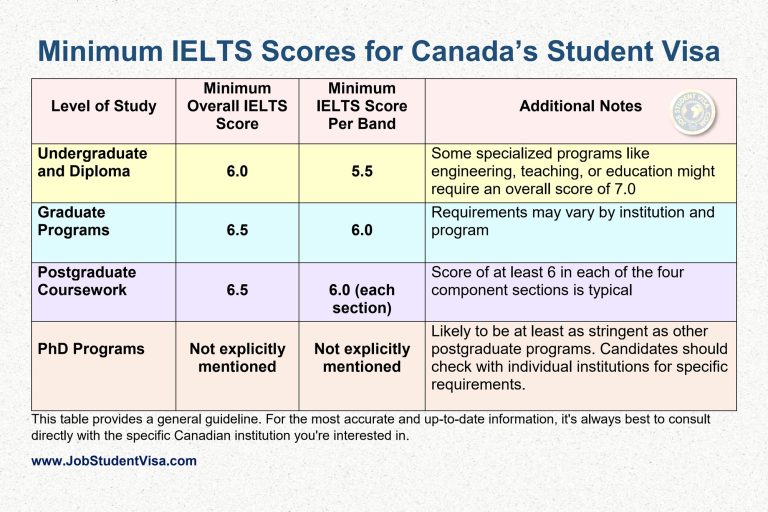IELTS Scores Requirements for Study in Germany: Minimum Range
Germany, known for its robust education system and emphasis on research and innovation, is a popular destination for international students. While many programs, especially at the graduate level, are offered in English, proving English language proficiency is crucial. The International English Language Testing System (IELTS) is one of the accepted tests in Germany for this purpose. It assesses English skills in listening, reading, writing, and speaking.
Germany, renowned for its world-class education system and a plethora of academic opportunities, attracts a vast number of international students each year. For those seeking to pursue their education in English, demonstrating proficiency in the language is a crucial step. One of the most widely recognized measures of English proficiency is the International English Language Testing System (IELTS). This article delves into the minimum IELTS scores required for pursuing higher education in Germany, a key consideration for students planning to embark on their academic journey in this culturally rich and technologically advanced nation.
Minimum IELTS Scores Requirements for Study in Germany
For Academic Admission in Germany
IELTS for University Admissions in Germany
- Undergraduate Programs: For bachelor’s programs taught in English, German universities typically require a minimum IELTS score of 6.0 to 6.5. This level ensures that students can comprehend academic material and actively participate in coursework.
- Program-Specific Requirements: Certain fields, such as business, humanities, and engineering, which have a higher emphasis on language, might demand higher IELTS scores.
IELTS for Postgraduate Studies in Germany
- Master’s Programs: The required IELTS score for master’s programs is usually around 6.5, reflecting the need for advanced English proficiency for research, presentations, and thesis writing.
- PhD Programs: For doctoral studies, the IELTS requirement can vary, but a score in the range of 6.5 to 7.0 is common, particularly for programs involving significant research and academic writing.
IELTS for Vocational and Professional Education
- Vocational Training: In Germany, vocational training programs may have lower IELTS requirements, typically around 5.5 to 6.0, as these courses may focus more on practical skills.
English Proficiency in German Higher Education
- Top German Universities: Prestigious institutions like the Technical University of Munich, Ludwig Maximilian University of Munich, and the University of Heidelberg often have higher IELTS requirements (6.5 or above) to maintain their academic standards.
- Specialized Courses: Certain specialized or competitive programs, especially at the postgraduate level, might have stricter IELTS requirements.
Factors Influencing IELTS Requirements in Germany
- Program Competitiveness: More competitive programs and universities often have higher IELTS score requirements.
- Field of Study: Courses that are heavily reliant on English, such as international business or English literature, often require higher IELTS scores.
- Institutional Policies: Each educational institution in Germany sets its own IELTS requirements based on its academic standards and language proficiency expectations.
IELTS Score Requirements for Study in Germany
Here’s a table summarizing the minimum IELTS scores typically required for various levels of education in Germany, including specific requirements for some of the top universities:
| Educational Level | Typical Minimum IELTS Score | Notes / Top Universities Requirements |
|---|---|---|
| Undergraduate Programs (Universities) | 6.0 – 6.5 | Higher scores may be needed for specific fields. |
| Master’s Programs | 6.5 | Research-intensive programs may require higher scores. |
| PhD Programs | 6.5 – 7.0 | Depends on the program’s research and language demands. |
| Vocational and Professional Education | 5.5 – 6.0 | Focuses more on practical skills than academic language. |
| Top German Universities (e.g., Technical University of Munich, University of Heidelberg) | 6.5 – 7.0 | Depending on the course and academic rigor. |
| Specialized/Competitive Programs | 7.0+ | Especially for fields requiring high language proficiency. |
This table provides a general guideline. Actual requirements can vary between different institutions and specific programs. Prospective students should always check the exact requirements of the program and university they are interested in. In Germany, some study programs might also be offered in German, for which proficiency in the German language would be required.
IELTS Requirements for German Visa
Is it mandatory to have an IELTS certificate to obtain a German student visa?
While the IELTS is a common requirement for English-taught programs in Germany, it is not universally mandatory for obtaining a student visa. The necessity of an IELTS score depends on the language of instruction of your chosen program, specific university requirements, and the regulations of the German embassy or consulate in your home country. Some programs, especially those taught in German, may require proof of German language proficiency instead. Additionally, certain applicants might be exempt based on their educational background or nationality. Therefore, it’s essential to verify both the university’s language requirements and the specific visa requirements for your situation.
For a student visa application in Germany, demonstrating language proficiency is often a requirement, but whether the IELTS is mandatory depends on various factors:
- Language of Instruction: If your course of study is in English, you will typically need to provide proof of English language proficiency. The IELTS is one of the most widely accepted tests for this purpose. However, some universities may accept alternative English language tests, such as the TOEFL.
- Program-Specific Requirements: Some programs, especially those taught in German, may not require an IELTS score. Instead, they might require proof of German language proficiency, like a TestDaF or DSH score.
- Visa Regulations: German embassies or consulates may have specific language requirements for issuing student visas. These requirements can vary by country and may not always align with university admission requirements. It’s important to check with the German embassy or consulate in your home country for the most accurate information.
- Exemptions: Certain applicants may be exempt from providing an IELTS score. For example, students from countries where English is an official language, or those who have previously completed an academic program in English, might not need to submit IELTS scores. Submitting a medium of instruction can fulfill the requirements.
- University Admission vs. Visa Application: Remember that university admission requirements and visa requirements are not the same. Even if a university admits you without an IELTS score, the German embassy or consulate processing your visa application may still require proof of language proficiency.
In summary, while IELTS is a common requirement for English-taught programs in Germany and for student visa applications, it’s not universally mandatory. It’s essential to check both the university’s requirements and the visa regulations specific to your situation.
In Germany, IELTS scores are an important part of the admissions process for international students in English-taught programs. A strong IELTS score is essential not only for meeting admission criteria but also for ensuring that students can effectively engage and succeed in an English-speaking academic environment. This is especially important for higher education programs and top universities, where the expectations for English proficiency are relatively high. Consequently, adequate preparation for the IELTS test is a crucial step for students aspiring to study in Germany







